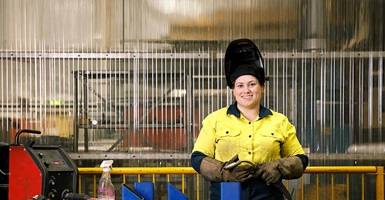When someone is struggling to cope with emotional, mental or lifestyle issues, it’s often a counsellor who helps them to work through their issues and get back on track.
Counsellors help their clients to develop strategies to take action and to cope with what’s happening in their lives.
It’s a growing industry with a 14.2% growth rate predicted.
Here’s what you need to know about starting a counselling career:
What attributes do you need?
To be a good counsellor, Chisholm counselling teacher Andrea Montefusco says you need to be non-judgmental, understand bias, and be a good listener. You also need to have good self-awareness and sensitivity to others, along with excellent people skills and communication skills.
What type of work does counselling involve?
Counsellors work with individuals, families or groups, interviewing people and helping them to resolve difficulties in their lives using therapy techniques. This may be in a variety of settings including private practice, community service organisations, schools, hospitals, clinics and government departments.
There are also opportunities to become specialised in a particular area. Examples include education or careers counselling, drug and alcohol counselling, relationship counselling, grief and loss counselling, or crisis and trauma counselling.
What are the challenges?
Counselling offers opportunities for diverse and interesting work and can be very rewarding when you’re able to help someone overcome a difficulty. However, there are some challenges.
“One key challenge is that the counselling industry is not regulated in Australia, as it is in some countries,” says Andrea. “This can make it difficult for clients to work out who is qualified to help them with their specific issues.”
“Another challenge around this is that counselling is often a generalised skill,” Andrea says. “However, some clients may think that you’re qualified and experienced in counselling on very specific issues. For example, not all counsellors are trained in dealing with people who are in crisis.”
Counselling courses and career pathways
Andrea says studying a counselling course gives you transferable skills you can use in many settings, particularly in the health industry.
“Counselling provides you with a set of skills not available in other courses,” he says. “You learn how to recognise body language and deal with people one-on-one and in groups, especially around difficult issues. These are highly transferable skills that can be used in any workplace.”
The Diploma of Counselling (CHC51015) will provide you with formalised and advanced counselling skills in order to assist you to develop, facilitate and monitor all aspects of case management, and build an effective relationship with your client. This course also provides a pathway to the Bachelor of Community Mental Health, Alcohol and Other Drugs (CRS1201285).
Andrea says counsellors sometimes move from the public sector to establishing their own practices. Counsellors also find work in various fields including drug and alcohol sector, aged care, disability care or mental health.
Ready to take the next step? Visit the Diploma of Counselling (CHC51015) page to apply today.


